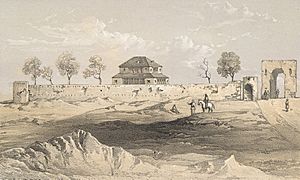John Banks (East India Company officer) facts for kids
John Sherbrooke Banks (1811–1857) was an important British major. He served in the British army in India during a time when Britain ruled much of India. He was known for his smart decisions and bravery.
Contents
Starting His Journey in India
Joining the Bengal Army
John Banks began his military career in 1828. He joined the Bengal army, which was the army of the British East India Company in India. A powerful politician named Charles Wynn helped him get started. Banks arrived in India in 1829.
He was first placed in the 33rd regiment of the Bengal Native Infantry. By 1833, he became the quartermaster and interpreter for his regiment. This meant he helped manage supplies and translated languages. For a while, he also worked on civilian tasks in the Saugor and Nerbudda areas.
Serving in the Kabul Campaign
In 1842, Banks joined General Pollock's army. This army marched to Kabul in Afghanistan. Soon after this campaign, Banks got a job in the military office. This office helped manage army paperwork and plans.
Working with the Governor-General
A Trusted Advisor
Later, in the military office, Banks met the Governor-General of India, the Marquis of Dalhousie. The Governor-General was the highest British official in India. Banks quickly earned Dalhousie's trust and respect.
The head of their department was away due to illness. So, Major Banks (who was then a Captain) had to make all the plans for an important military mission. This mission led to the British taking control of Pegu, a region in what is now Myanmar.
After the war, Banks traveled with Lord Dalhousie to British Burma. He then became a personal assistant to the Governor-General. His title was military secretary.
Mission to Oudh
In July 1855, Banks was sent on a secret mission to Lucknow. He had to tell Sir James Outram, a British official there, about the Governor-General's plans. These plans involved taking over the kingdom of Oudh.
Final Years and Legacy
Commissioner of Lucknow
When Lord Dalhousie left India, Major Banks joined the Oudh commission. He became the commissioner of Lucknow. Here, he became a trusted friend and advisor to the chief commissioner, Sir Henry Lawrence.
Death in Lucknow
Sir Henry Lawrence was badly injured and, before he died, he chose Major Banks to take his place as chief commissioner. However, Banks himself died just a few weeks later.
Sir John Eardley Inglis wrote about Major Banks's death. He mentioned that the soldiers were still sad about losing their general. Then, they had to mourn Major Banks. Banks was a skilled and respected officer. He was sadly killed on July 21 while checking an important army position.
Major Banks was known for his excellent judgment and good manners. He was hardworking in his duties. He was also a brave soldier and very good at languages. His wife, the daughter of Major-general R. B. Fearon, received a special pension. This was given by the India Office to honor her husband's service.
 | James Van Der Zee |
 | Alma Thomas |
 | Ellis Wilson |
 | Margaret Taylor-Burroughs |


